

March 21, 2019
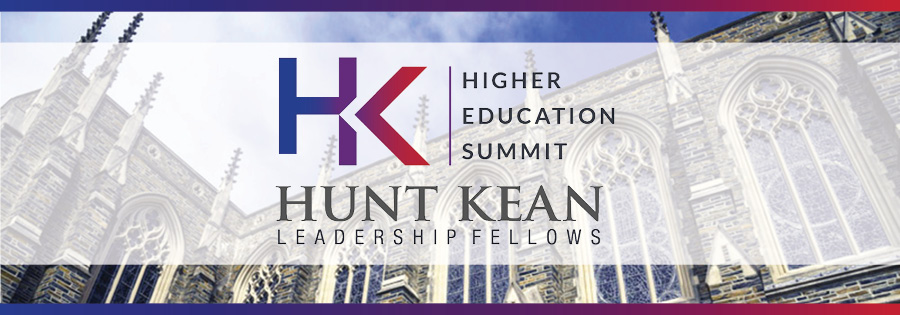
The Hunt Institute expanded on our flagship Hunt-Kean Leadership Fellows program by convening Fellows from across cohorts for the Higher Education Summit, a two-day meeting that highlighted the most promising postsecondary policy opportunities available to state leaders.
The Summit, held on March 5-6, 2019 at Duke University in partnership with the Sanford School of Public Policy, featured six former governors and a number of resource experts and practitioners who engaged Fellows in lively, candid discussions on a variety of higher education topics.
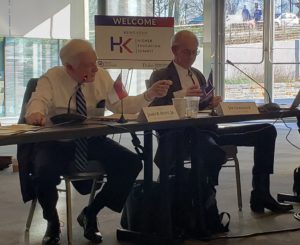
Governors Jim Hunt and Jim Geringer shared their insight and experience throughout the event.
The Summit is the latest step in the Hunt Institute’s efforts to ensure that state leaders have the knowledge base they need to make informed decisions about policies that span the entire education continuum – from early learning to the workforce. The Fellows who attended seized the opportunity to drill down on particular higher education issues that had direct implications for education policy initiatives in their home states.
The diversity of perspectives featured at the Summit enabled Fellows to approach postsecondary issues from many different angles throughout the conversations. The Fellows didn’t simply discuss why issues like completion matter, they engaged with practitioners who have implemented innovative solutions, students whose lives have been affected by policy initiatives, and former governors who have led the charge for bold change.
All Fellows received an Issue Brief prior to convening, providing relevant background information to establish a foundation for the robust conversations that ensued throughout the meeting.
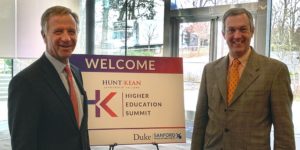
Governor Bill Haslam and Tennessee Secretary of State Tre Hargett.
The Summit kicked off with a discussion that featured Governor Bill Haslam, who described the pioneering steps he took in Tennessee to enact first-of-its-kind higher education policies such as establishing a postsecondary attainment goal, providing two years of tuition-free community and technical college, and tying state higher education funding to a variety of student outcome metrics.
Governor Jim Geringer added his perspective by describing the postsecondary completion gaps he observed in the mid-1990s which led to the establishment of Western Governors University – a competency-based online learning model that is an important component of state efforts to raise attainment rates.
The Fellows also engaged with two of the country’s leading State Higher Education Executive Officers – Dr. Kim Hunter Reed, who described her experience leading higher education systems in Colorado and Louisiana, and Ben Cannon, who talked about his efforts in Oregon to recruit and retain underserved student populations such as first-generation students, students of color, and adult learners. The discussion highlighted a number of scalable strategies that Fellows can implement in their home states to boost FAFSA completion rates, leverage data to identify completion gaps, and expand dual enrollment opportunities for all students.
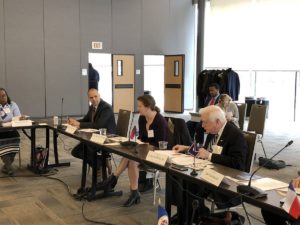
Founder & CEO of College Advising Corps Dr. Nicole Hurd shared information about the importance of high school advisors.
In order to ground the policy discussions in real, lived experiences, the Fellows heard directly from students at various points of the Summit as they spoke about their journeys through higher education. During a presentation on the College Advising Corps (CAC) program, which places recent college graduates in high schools across the country to provide “near-peer” postsecondary counseling, a CAC advisor was joined by her former advisee who is now enrolled in college. The pair described how access and affordability challenges had impacted their lives and how the program had influenced their pathways.
The Hunt Institute’s President & CEO Dr. Javaid Siddiqi served as a facilitator throughout the program, connecting the content shared from resource experts to Governors’ experiences and enhancing the conversation and learning around the table.
At the end of day one, Fellows broke out into small group discussions for the Professional Perspectives session – a hallmark of Hunt Institute programs. Each table of Fellows engaged with an institution administrator and a current college student to ask questions about how institution leaders have designed initiatives to support students on campus and about how such initiatives have allowed students to access and succeed in higher education.
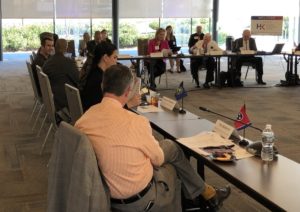
Board member Laura Fornash opened up a policy discussion, “Strategies to Support College Completion.”
The Summit concluded with a bipartisan Leadership Panel that featured five former governors: Governor Jim Hunt (NC), Governor Jim Douglas (VT), Governor Jim Geringer (WY), Governor Jim Hodges (SC), and Governor Dannel Malloy (CT).
These distinguished leaders described the successes and challenges they encountered as they led various higher education policy initiatives in their states, engaging with the Fellows as they asked how to turn ideas into action given political and policy considerations.
Other activities included:
In order to capture and summarize all of the material highlighted during the Summit, attendees were given a Key Takeaways document that includes suggestions on how they can take action once they return to their home state.
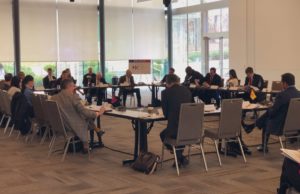
The diversity of perspectives enabled Fellows to approach postsecondary issues from many different angles.
Ultimately, in the words of Governor Hunt, the Summit was “a great success.” Fellows had positive reviews as well, with one attendee describing the Summit as “incredibly inspiring, empowering and enriching” and another saying, “I will be excited to bring [this] information to the legislature and governor.”
We appreciate Fellows making time to engage in learning around the important issues and look forward to supporting them as they continue to make great progress in educational excellence and equity.
We were thrilled to be joined by a number of friends whose support made the Summit, and so much of the Hunt Institute’s work, possible, including representatives from the John M. Belk Endowment, the Lumina Foundation, Dominion Energy and the SAS Institute. We remain incredibly appreciative of their time and support.
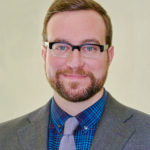
Author
James Mikolowsky
Policy Analyst, The Hunt Institute